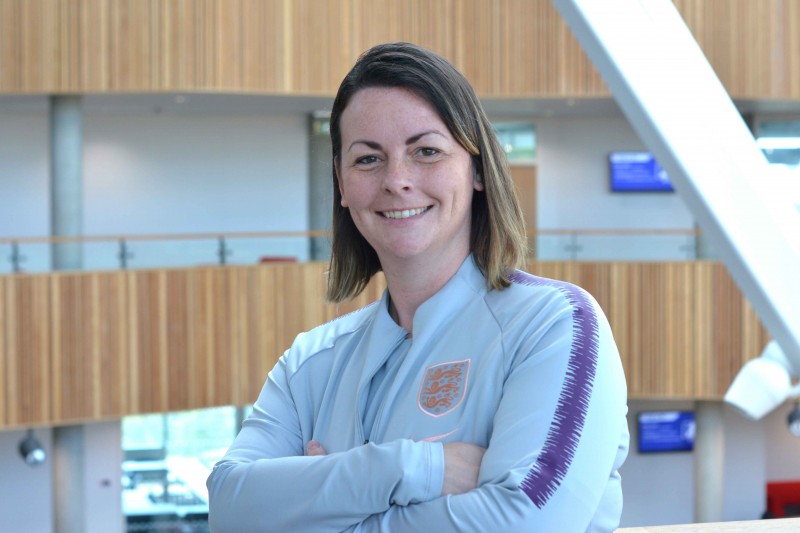“Sport changes lives and to be the person who’s creating those interventions – it’s not only a big responsibility, but it’s something I’m really proud of.”
With the 2019 Women’s World Cup capturing the nation’s interest and reaching record audiences, BU graduate Clare Daniels is at the forefront of inspiring the next generation of female football talent.
In her role as the Women’s National Development Manager for Workforce and Innovation at the Football Association (FA), Clare is responsible for workforce development which is essential in helping to support the FA’s aims to double participation by 2020 and get football on the curriculum for girls by 2024.
Within her innovation remit, she also creates modern fit-for-purpose programmes and projects that are provided by the FA for everyone from young children to adults, inspiring and enabling them to play and enjoy football.
“For the first time people can have now have real aspirations to be a full-time paid professional in women’s football, which is generating an interest in a whole new range of people,” said Clare, who graduated from BU’s BSc (Hons) Sports Development and Coaching Sciences degree in 2006.
“They are wanting to play, they are wanting to coach, they are wanting to referee and we have to deal with that big demand across all areas of the game.
“This is just the beginning and it’s a great time to be involved. I suppose the thing that gets me out of bed in the morning is knowing that, with the programmes we are implementing, we could potentially change the lives of a generation of inactive kids through the power of sport.
“Sport changes lives and to be the person who’s creating those interventions – it’s not only a big responsibility, but it’s something I’m really proud of.”
Clare has worked for the FA since graduating from BU, after starting as an administrator at Dorset FA.
She credits the practical aspects of her degree for giving her the head start she needed to get a foot in the door of the competitive football industry.
“The best thing about the course was that it involved experiential learning from day one – so by the time I graduated, I had four years of coaching experience under the guidance of some really good coaches.
“I also had the academic support and understanding of why we were doing what we were doing, seeing those principles academically but then also practically.
“I think that’s really powerful, because you understand why you’re doing things, which is really important when you’re trying to develop young people.”
Clare had taken a year out after completing her A levels and initially wasn’t sure if university was the right path for her. But after hearing students from the Sports Development and Coaching Sciences degree talk about their course at her swimming club, she decided to apply.
“They were just talking about how good it was, and the more they spoke about it, the more this spark inside me ignited that I didn’t know I had,” she said.
“So I thought I’d have a go, put my name down and got accepted and it is probably the best decision that I’ve ever made – coming here and growing and developing over the course of four years.”
“Getting that experience on the ground with AFC Bournemouth, with Dorset County Football Association – when I finished university, I was lucky enough to be in full-time work from the September in sport, in football, which was unheard of.”
Her advice to those who wish to follow in her footsteps and make it in the sports industry is to look beyond the academic qualifications to additional experiences and development opportunities that can help you stand out in the crowd.
“You need something different, you need somebody who’s shown the determination and the resilience to manage not only their studies but also tried to find other things that benefit their long-term development within sport,” said Clare.
“Dream big, take risks and you’re only going to get out what you put in. Just like in sports performance – if you want to be an international athlete, you train hard, you work hard, you find every possible marginal gain you can to be the best you can be. You have to apply that mentality to working in the sports industry and your academic studies.
“If you want to work in sport, it’s tough but once you’re in, you can make a huge impact on thousands of young people and adults.”
We no longer offer BSc (Hons) Sports Development and Coaching Sciences, we now offer BSc (Hons) Sport Coaching. Find out more about studying BSc (Hons) Sport Coaching at BU.
